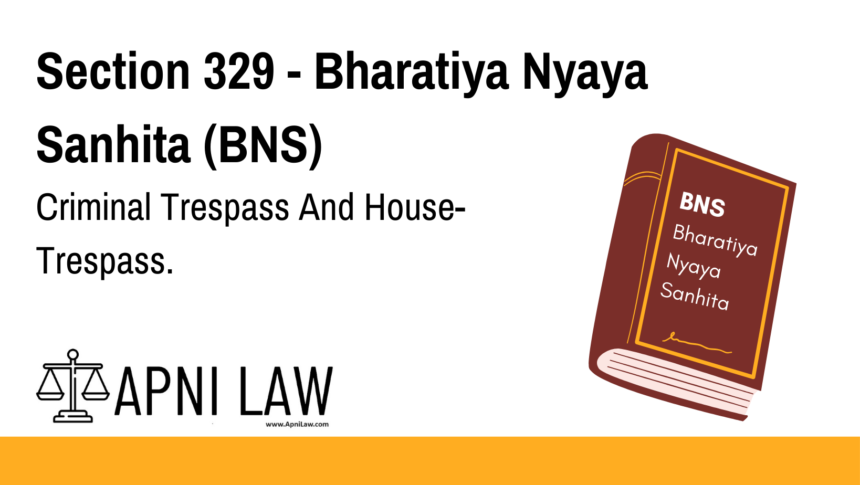Code: Section 329 BNS
(1) Whoever enters into or upon property in the possession of another with
intent to commit an offence or to intimidate, insult or annoy any person in possession of
such property or having lawfully entered into or upon such property, unlawfully remains
there with intent thereby to intimidate, insult or annoy any such person or with intent to
commit an offence is said to commit criminal trespass.
(2) Whoever commits criminal trespass by entering into or remaining in any building,
tent or vessel used as a human dwelling or any building used as a place for worship, or as a
place for the custody of property, is said to commit house-trespass.
Explanation.—The introduction of any part of the criminal trespasser’s body is entering
sufficient to constitute house-trespass.
(3) Whoever commits criminal trespass shall be punished with imprisonment of either
description for a term which may extend to three months, or with fine which may extend to
five thousand rupees, or with both.
(4) Whoever commits house-trespass shall be punished with imprisonment of either
description for a term which may extend to one year, or with fine which may extend to five
thousand rupees, or with both.
Explanation of Section 329 BNS
Section 329 of the Bharatiya Nyaya Sanhita (BNS) defines criminal trespass and house-trespass, which involve unlawful entry into another person’s property with malicious intent.
Key Elements:
- Criminal Trespass:
- Unlawful entry or remaining on someone’s property.
- Intent to commit an offence, intimidate, insult, or annoy the owner or possessor.
- Includes situations where a person lawfully enters but unlawfully remains with malicious intent.
- House-Trespass:
- Unlawful entry into a dwelling, place of worship, or property storage area.
- Even partial entry (like putting a hand inside) qualifies as house-trespass.
- Punishment:
- Criminal Trespass: Up to 3 months of imprisonment, or a fine of up to ₹5,000, or both.
- House-Trespass: Up to 1 year of imprisonment, or a fine of up to ₹5,000, or both.
Illustration
Example 1: Entering a Neighbor’s Land Without Permission
A person enters a neighbor’s land intending to steal crops. This act is criminal trespass and punishable under Section 329.
Example 2: Unlawful Entry into a House
An individual forces their way into a house to intimidate the residents. This qualifies as house-trespass, with stricter punishment.
Example 3: Intimidation at a Worship Place
Someone enters a temple to disturb prayers and intimidate worshippers. This is house-trespass under Section 329.
Common Questions and Answers on Section 329 BNS
1. What is the difference between criminal trespass and house-trespass?
Answer:
- Criminal Trespass applies to unauthorized entry into any property with malicious intent.
- House-Trespass applies specifically to dwellings, places of worship, or property storage spaces.
2. Can I be punished for just putting a part of my body inside someone’s property?
Answer: Yes, even partial entry, like sticking your hand through a fence, can be considered house-trespass.
3. What are the penalties for these offenses?
Answer:
- Criminal Trespass: Up to 3 months of imprisonment or a fine of up to ₹5,000, or both.
- House-Trespass: Up to 1 year of imprisonment or a fine of up to ₹5,000, or both.
4. Does the law apply if the person had permission but overstayed?
Answer: Yes, if a person lawfully entered but unlawfully remained with malicious intent, it still qualifies as criminal trespass.
Conclusion
Section 329 BNS ensures the protection of private property and personal space, especially in sensitive areas like homes and places of worship. The law defines clear boundaries for what constitutes unlawful entry and prescribes punishments to deter such offenses.








